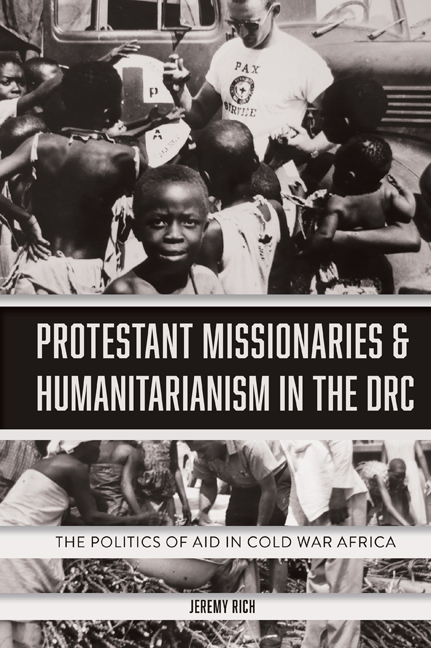Book contents
- Frontmatter
- Contents
- List of Illustrations
- Acknowledgements
- List of Abbreviations
- Introduction
- 1 The CPRA, Protestant Missions, and the Congo Crises, 1960–1965
- 2 The CPRA and Luba Refugees in South Kasai, 1960–1962
- 3 The CPRA and Angolan Refugees in the DRC, 1961–1967
- 4 The CPRA and the Simba Revolts, 1964–1967
- 5 Operation Doctor: The Rise and Fall of a Protestant Short-Term Medical Volunteer Programme
- 6 Protestant Volunteers and Medical Practice in the Congo in the 1960s
- 7 Changing Dollars into Zaires: The Challenges of a Humanitarian Aid NGO in the DRC, 1965–1973
- 8 The Centre for Community Development
- Conclusion
- Bibliography
- Index
7 - Changing Dollars into Zaires: The Challenges of a Humanitarian Aid NGO in the DRC, 1965–1973
Published online by Cambridge University Press: 11 September 2020
- Frontmatter
- Contents
- List of Illustrations
- Acknowledgements
- List of Abbreviations
- Introduction
- 1 The CPRA, Protestant Missions, and the Congo Crises, 1960–1965
- 2 The CPRA and Luba Refugees in South Kasai, 1960–1962
- 3 The CPRA and Angolan Refugees in the DRC, 1961–1967
- 4 The CPRA and the Simba Revolts, 1964–1967
- 5 Operation Doctor: The Rise and Fall of a Protestant Short-Term Medical Volunteer Programme
- 6 Protestant Volunteers and Medical Practice in the Congo in the 1960s
- 7 Changing Dollars into Zaires: The Challenges of a Humanitarian Aid NGO in the DRC, 1965–1973
- 8 The Centre for Community Development
- Conclusion
- Bibliography
- Index
Summary
The early years of Mobutu Sese Seko's dictatorship in the Democratic Republic of Congo (DRC) from 1965 to 1973 constituted a period of misplaced optimism for foreign aid. Critics of foreign aid have used the DRC as the model of how state corruption, Cold War politics, and poorly designed donor aid packages led to disaster. After briefly reviewing Mobu-tu's success in obtaining aid, Carol Lancaster succinctly summarised her findings: ‘The implication of this analysis is that foreign aid, when provided to a regime whose legitimacy is weak, can prolong the life of the regime.’ Likewise, the squandering of aid by Mobutu's government reinforces James Ferguson's conclusion that aid only reinforced state power, rather than achieve its stated objectives.
This chapter examines how Congolese stakeholders and Western donors debated the terms of their relationship from Mobutu's ascension to power until the Congolese economy fell into decline beginning in 1973. The negotations of the World Council of Churches (WCC) with the CPRA reveal the complexities of the role of humanitarian aid in the DRC. Church World Service (CWS) and WCC funding show how humanitarian assistance served the US government's goal of ensuring Mobutu remained in power. CWS officials initially viewed their efforts as building a stable DRC, particularly from 1965 to 1968. Over the course of the late 1960s and early 1970s, CWS staff became frustrated with Disciples of Christ pastor Jean Bokeleale, a committed Congolese nationalist. A majority of Congolese representatives of different churches had elected Bokeleale as chairman of the Congo Protestant Council in 1968, which served to promote cooperation between churches. Bokeleale convinced representatives to vote to transform the Congo Protestant Council (CPC) into the Église du Christ au Congo (ECC). This new institution served as an umbrella organisation of different denominations under a single legal framework and constituted the most ambitious example of church union in Africa in the 20th century. While individual churches (now known as communities) could maintain separate theological views and liturgical practices, they henceforth operated under a single bureaucratic structure designed to handle legal disputes, government relations, and oversee development programmes.
- Type
- Chapter
- Information
- Protestant Missionaries and Humanitarianism in the DRCThe Politics of Aid in Cold War Africa, pp. 180 - 204Publisher: Boydell & BrewerPrint publication year: 2020



